A Dream of Equality
Imagine a school where children have the freedom to wear clothes of any gender, any colour, and any style they feel comfortable in. A school where boys learn the art of cooking and host feasts for locals while girls flex their muscles and wrestle competitively in the courtyard. A school where each child understands and can differentiate a ‘safe touch’ from an ‘unsafe touch’. One where each child respects personal boundaries and accepts the strengths and weaknesses of their fellow classmates.
Through the efforts of my teammates and I at the Barefoot College, there exist a day school and a residential bridge school, and 49 Digital Night Schools spread across 11 states, where we have worked with teachers and local communities to develop and integrate gender-sensitive curriculums.
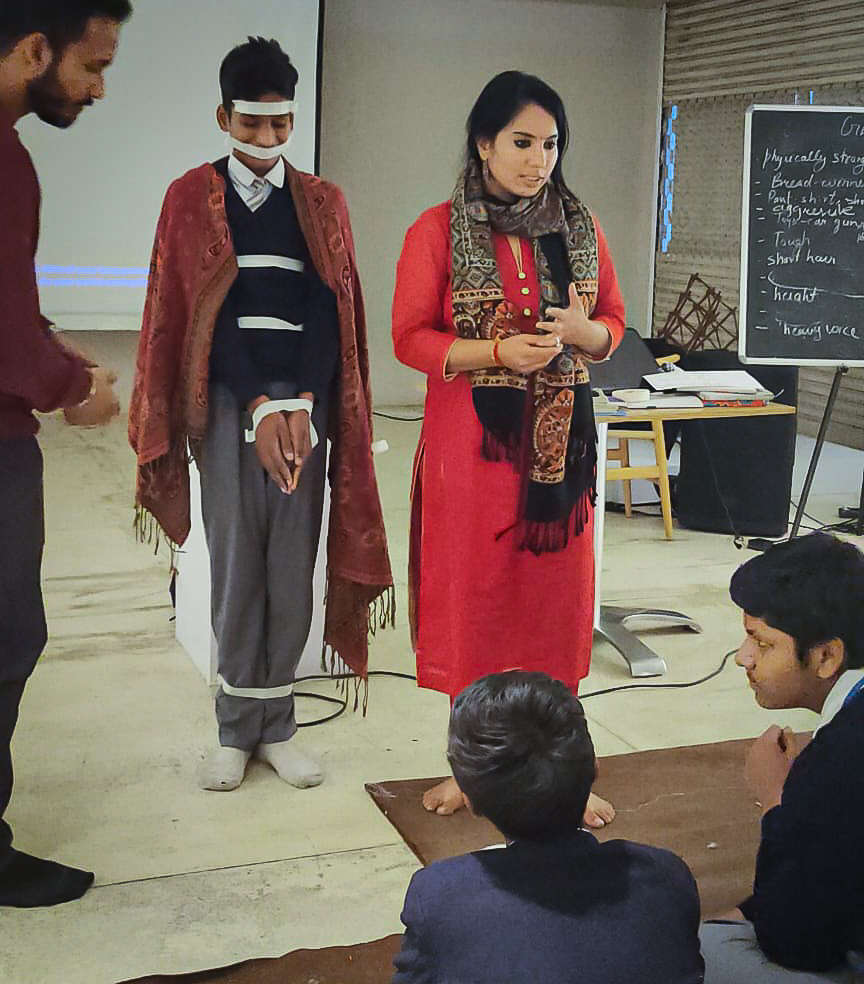 Sanjana leads a demonstration on gender role reversal
Sanjana leads a demonstration on gender role reversalWhy Gender Sensitivity is Crucial
Traveling through the rural areas of Rajasthan back in 2017, I couldn’t help but notice how gender-based discrimination is engraved deeply in the very roots of our society. During the initial surveys, I discovered 6-year-old children saying that it was okay to beat the woman if she commits a mistake and that the only aspiration 10- year-old girls had was to become a “lugai”(wife). Girls expressed that they are not given milk, almost 30% of the children were married and more than half of them were victims of child abuse. I believe that the mentality that denies women power can only be restructured at the root level of its origination. By reaching out to the most marginalised communities who are the most suppressed, neglected, unheard populations, we are transforming the mindsets of our future generation in their formative years.
With the idea of Gender Equity Clubs in rural areas for children belonging to the 6- 14 years age group, we have successfully neutralised gender-dominated spaces by engaging children in various activities and awareness sessions on child abuse, domestic violence, and child marriage, stereotypes, menstruation, etc. Using a ‘learning-by-doing’ approach, we engage and sensitise children on gender-issues using tools such as poster-making, storytelling, poetry recitals, debates, skits, movie screenings, and group activities.
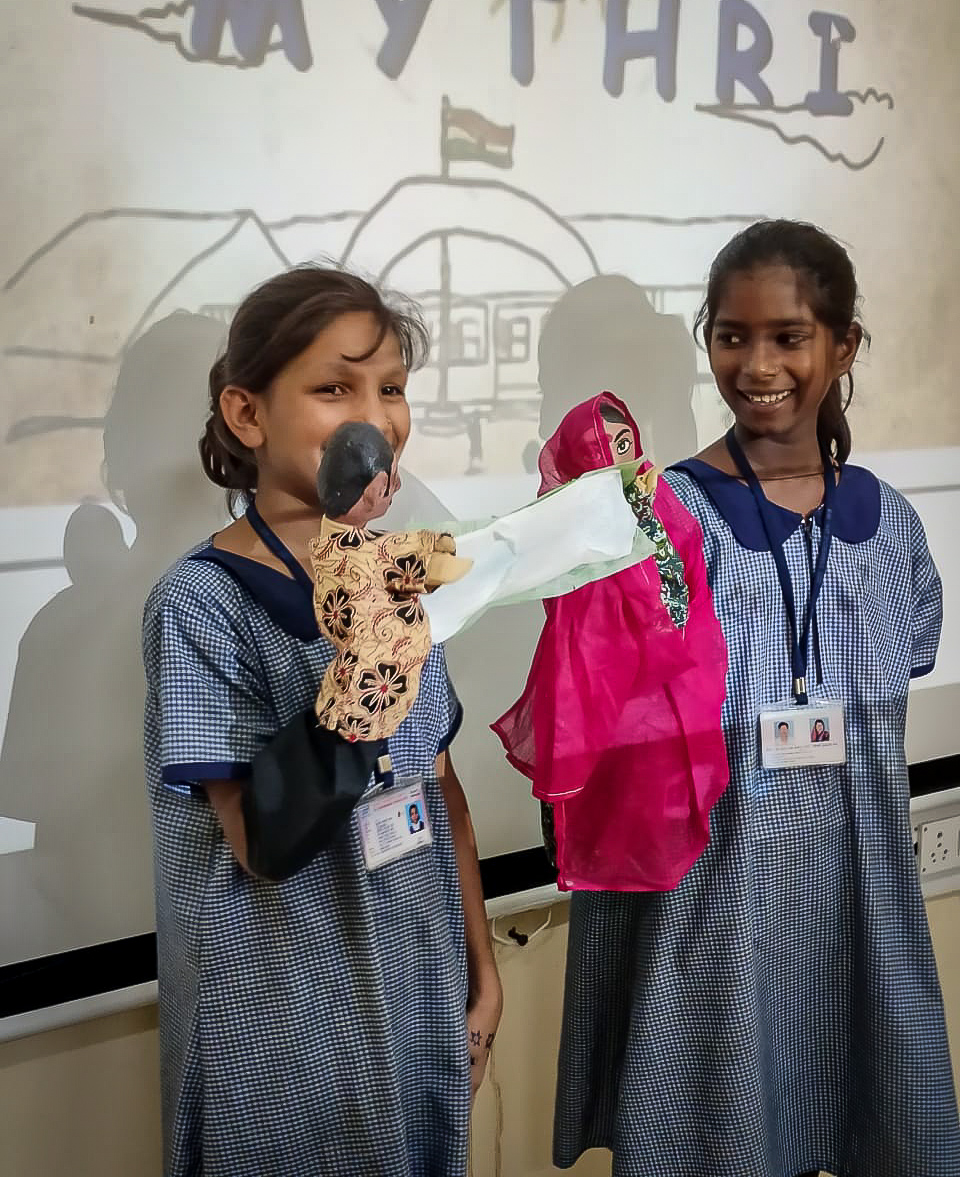 Artistic expression tools can help to sensitise children to gender issues
Artistic expression tools can help to sensitise children to gender issuesWe also work on Social Emotional Learning with our young children with a focus on nurturing children as self-aware, responsible, confident, happy individuals. As Zoe Weil (2016) says: ‘the world becomes what we teach’. This could be extended to embrace the idea that the world will not become what we don’t teach! And what do we not teach actively and deliberately in Indian schools? Universal respect for human dignity; questioning, dissent and differing points of view; experiencing deep authentic learning; rigorous modeling of ethical practice; acceptance of diversity in people’s behaviour, lifestyles and interests. Through the SEL curriculum, we are striving to create young children who are self-aware, humane, responsible in both a civic and moral sense, and consciously striving for a more equitable world.
One is not born but becomes a man and woman
Beauvoir has said this in 1956, but I never realised it as I grew up in a rural conservative household in Haryana. I witnessed how women were dehumanized and deprived of their basic rights. In 2016, I lost my cousin to domestic violence. That’s when I decided to dedicate my entire life to lessening gender-based violence and discrimination. Thus I started working in rural schools in Rajasthan where I saw that 30% of my students were already married. 80% had stereotypical notions. Notions need to be corrected. Thus my project aims at sensitising students and teachers about gender issues to promote critical thinking, break stereotypes and deconstruct identities so that gender equity space can be created during their formative years.
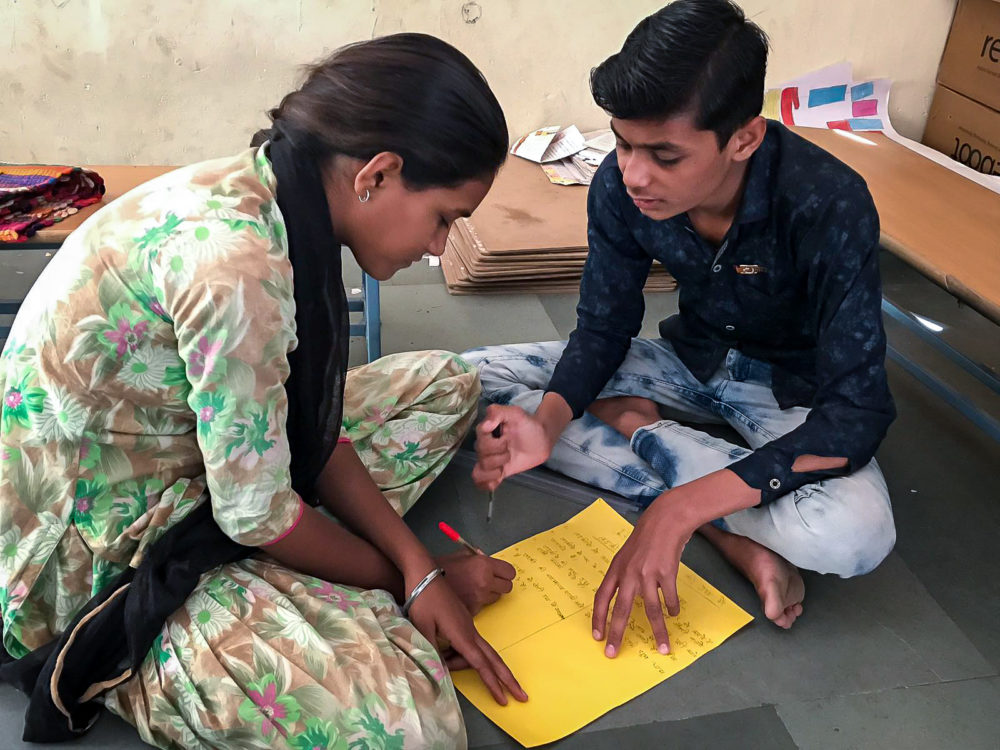 Two future champions of Gender Equality?
Two future champions of Gender Equality?Safety, Consent and Shifting to Kindness
The impact has been quite gratifying as my school children have become champions of gender equality. My vision is to give closure to #metoo experiences and create a generation of equals where there are no binaries and we see each other as human beings and not as men and women. The unjust treatment of women has occurred throughout my life. After losing a cousin to domestic violence, I decided to dedicate my life to the purpose of mitigating gender violence and providing relief to the amputated spirits of those women who have lived through sexual assault and abuse.
The curriculum is not limited to breaking the stark gender roles built in our society. In these schools where boys cook food along with the girls and girls play football with fellow classmates, they also learn to identify risk and learn the importance of consent. Students learn physical skills to enforce their position. Boys learn to challenge rape myths, ask for consent, and intervene if they anticipate or witness predatory behaviour. The aim is to teach the students the mental, verbal and physical skills they need to stay safe and change their culture of sexual coercion and violence by freely talking about the same.
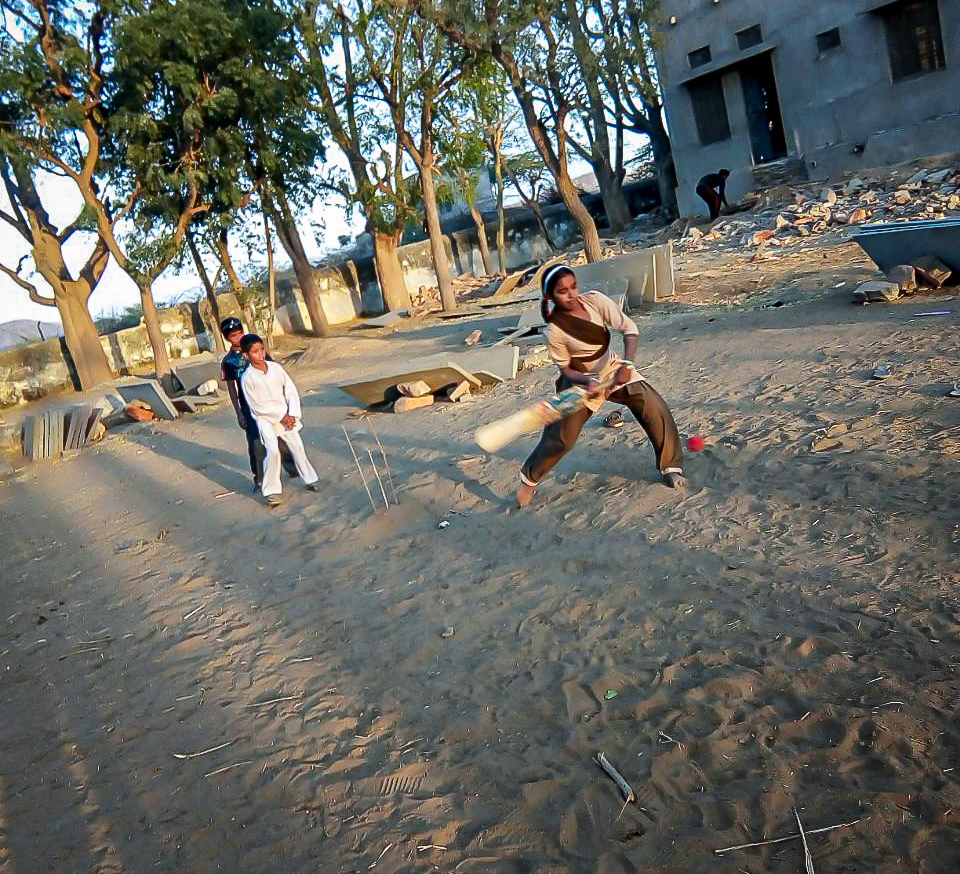 You hit “like a girl?”-good- girls can play sports, too
You hit “like a girl?”-good- girls can play sports, tooIn this long journey of breaking gender norms in 11 states in collaboration with Barefoot College, the biggest challenge I have faced is resistance from the community. It has been difficult to highlight the relevance of gender sensitivity in the most patriarchal regions of India without hurting cultural beliefs. In this journey of impacting lives, the short-term impact is not really visible. It is natural to feel demotivated at times, there is a need for validation and acknowledgment.
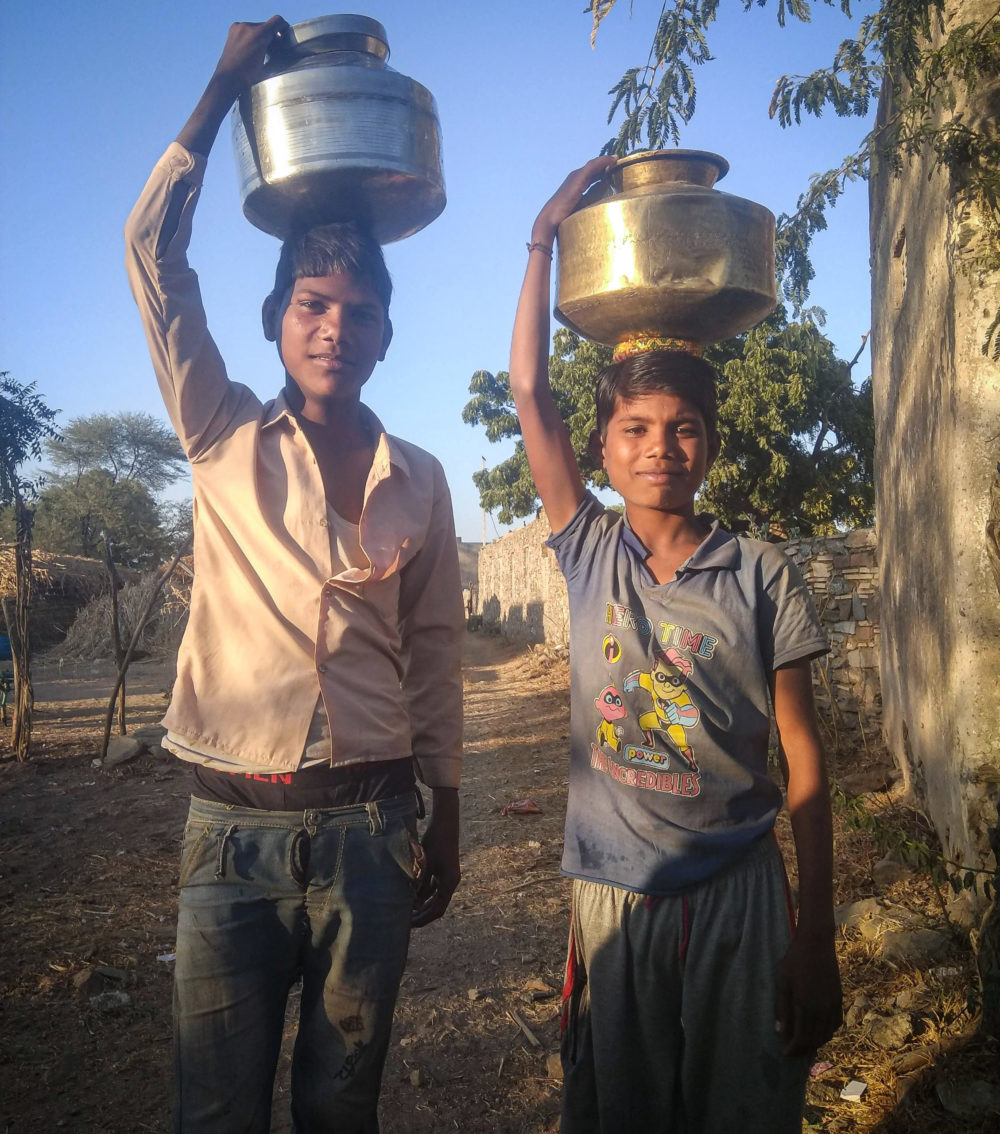 Young boys carry water- a job that’s often expected of women
Young boys carry water- a job that’s often expected of womenGaining Acceptance for Accomplishing Amazing Things
This is when V-Awards, an initiate by UN Volunteers India, provided the much- needed recognition and motivation to my work. We still live in a world where volunteer projects are not acknowledged as ‘real work’ and people are still afraid to support these initiatives. Personally, due to the stereotypical myths of ‘Samaj Seva’ (social service) prevalent in India, my parents couldn’t appreciate my choice of volunteering in the rural sector. Being applauded as a V-Awardee has not only helped me gain acceptance and understanding from my family but has also added more credibility to my work professionally.
I firmly believe that the journey of a thousand miles begins with a small step. We are a step ahead in creating a society of gender equals, but there is still a long way to go in creating a generation of equals. The only thing between you and your passion is one step. Have the courage and take a leap, because the journey of volunteering has a lot to offer, both personally and professionally. The key is to just be brave and courageous!
-Story shared by Barefoot’s Sanjana Yadav, Gender Education
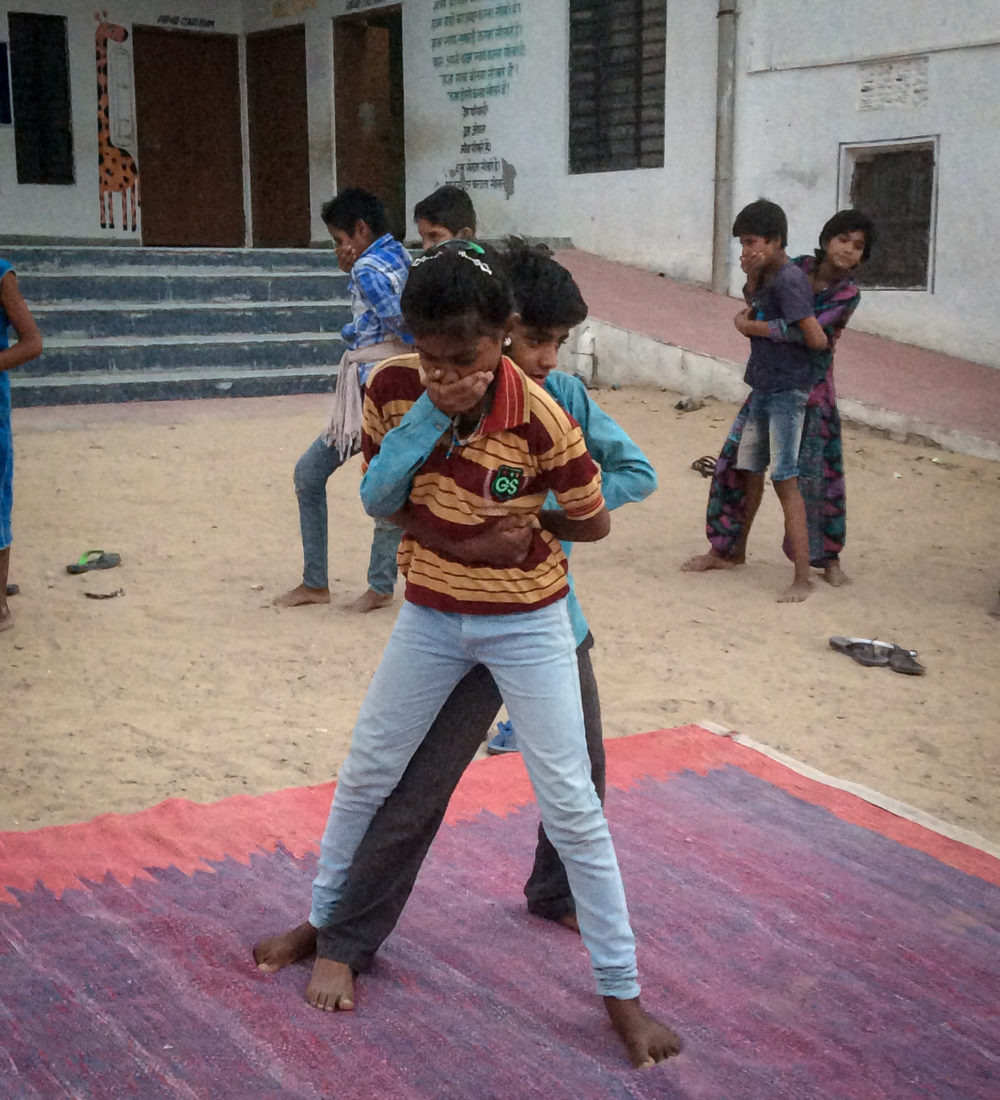 The efforts of Barefoot’s Education team gives girls more chances to participate, grow and learn
The efforts of Barefoot’s Education team gives girls more chances to participate, grow and learn
